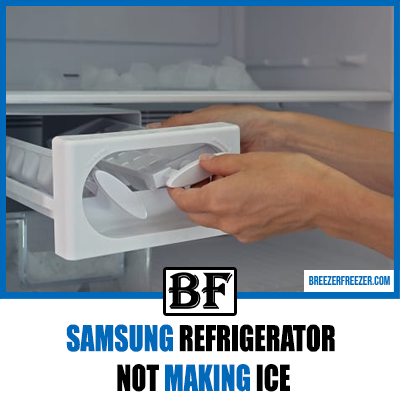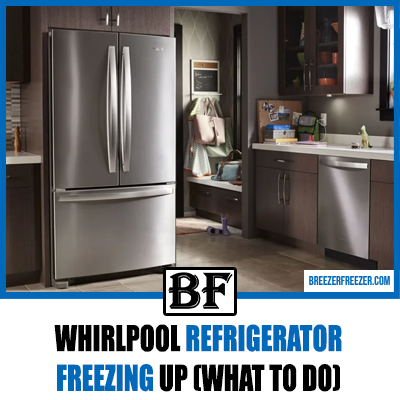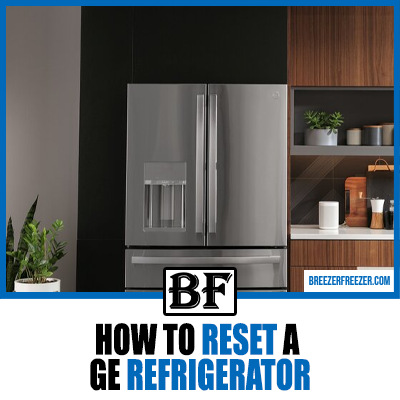How Long Should A Refrigerator Run Before Shutting Off?
The whirring and buzzing sounds of the refrigerator can tell you that it’s running well and there’s no need to worry.
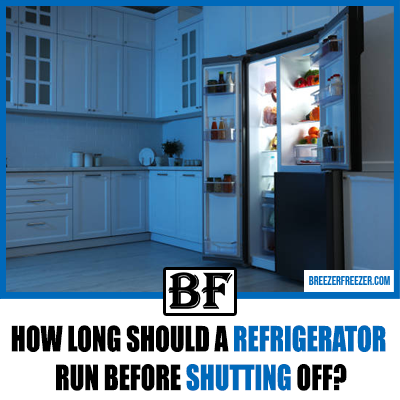
The question is whether it should run all the time? If there’s one appliance in the kitchen that we rely on the most, it’s the refrigerator.
Not to mention the fact that it is one of the most expensive items present in the kitchen, making it crucial to understand its function.
Malfunctions in the refrigerator can cause it to run all the time or shut off earlier than required.
Either scenario is not good news since running all the time will waste energy, and impaired function could spoil food in the fridge. In this article, we’ll try to explain the appropriate functioning of modern refrigerators.
Should The Refrigerator Run All The Time?
The short answer is that an average refrigerator does not need to be constantly running for the best outcome.
Generally, it is good enough if a refrigerator unit runs 80 to 90% of the time instead of running all the time. When it runs for this amount of time, the interior temperature remains stable enough to keep the food fresh.
Since the run time is dependent on the refrigerator compressor, there could be a variation in the actual time the fridge is working.
Usually, there are compressor cycles that impact how long the refrigerator must run before shutting. Thus, the refrigerator cycle, along with the food content and inside temperature, will determine how long the fridge runs.
How Long Should A Refrigerator Run?
It’s difficult to provide a blanket statement for all refrigerator models because there are several factors that determine the run time.
That being said, a regular refrigerator should be up and running for at least four hours before it shuts off. Of course, it needs to be set at the desired temperature, too, if the food is to remain fresh.
When you buy a brand-new model, the refrigerator compressor is in the best shape possible, which allows it to run for shorter periods of time.
As the device ages, the system needs to work harder to generate cold air and keep the refrigerator running. Thus, the run time increases gradually, which in turn increases energy costs.
Additionally, a larger refrigerator needs a longer time to maintain a stable cold temperature; thus it will tend to run longer.
Also, if you store hot food often in the fridge, it will require more energy and sometimes more time to get the inner temperature right. So, you’ll see that refrigerator run time can differ depending on size, make, model, age, and the types of food stored in it.
Let’s further understand the factors that affect refrigerator run time in detail.
Factors That Affect How Long Refrigerators Will Run Before Shutting Off
1. Ambient Room Temperature

The temperature in your room can extend the time the refrigerator requires to build up cold air inside. If it’s warmer in the rooms, the fridge takes up more energy to reach the correct temperature, and its functions also slow down.
Thus, you’ll see that refrigerators in locations with higher ambient temperatures run all the time without a break. There’s not much one can do about this except to keep an eye out for ventilation systems. Since the refrigerator runs all the time, there is a risk of overheating if the excess heat is not allowed to dissipate.
To solve this issue, it is recommended to place the refrigerators in a breezy corner of the kitchen and avoid sticking them close to the walls.
2. Inner Refrigerator Temperature

Sometimes turning the thermostat on full does not necessarily shorten the time taken for the refrigerator to run. This can happen when one stores warm food items or a hot liquid in the refrigerator. Warmer foods increase the temperature inside the fridge, creating strain on the system to convert warm air into cool air.
Basically, the refrigerator needs to maintain a consistent temperature below the ambient temperature to keep food from spoiling. This is why placing piping hot foods in the refrigerator must be avoided.
Apart from that, the quantity of food and number of dishes the refrigerator needs to keep cool also matter. A stuffed refrigerator is more likely to have little to no ventilation, and cooling will take much more time.
Also, if there always seems to be too much food in the fridge, it may be time to consider upgrading to a larger refrigerator.
3. Interior Light
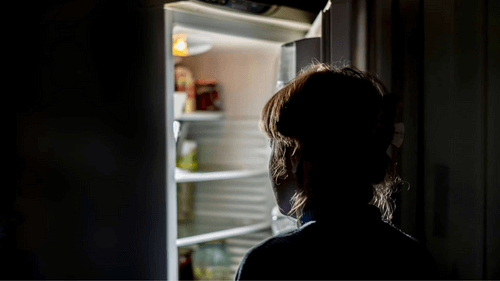
If you observe the fridge up close, you’ll see that there are interior lights that turn on as the door opens. These lights are supposed to shut off when the door closes, but this system can malfunction at times.
If the lights remain on even after closing the door, the refrigerator needs to work extra hard to reach a cooler consistent temperature.
Essentially, this will keep the fridge running constantly and add to the pressure of creating a cooler environment.
4. Damaged Door Gasket
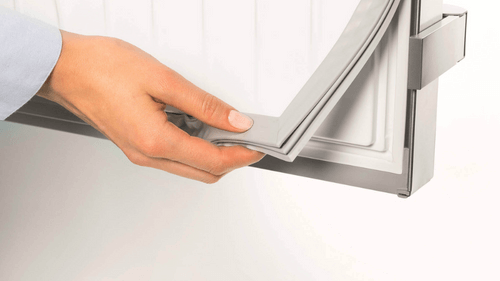
The gasket acts as a door seal that keeps the cooler air in the fridge after closing the doors.
Unfortunately, the rubber gasket may get spoiled due to frequent use or other reasons, causing the fridge doors to shut incorrectly. If you have a damaged door gasket, cool air can leak out even after closing the fridge door.
It may be difficult to spot at first and sometimes may be impossible to notice. If the gasket is considerably damaged, there could be indications of moisture droplets near the door.
Alternatively, some homeowners find water leaks and even pools of water around the doors which shows that the gasket isn’t in the best condition.
On that note, the droplets or water leakage may also occur if you keep the fridge door open for a long time. The main thing to remember is that if the fridge is unable to maintain the proper temperature, it will constantly run to cool the air.
Fixing A Refrigerator That Keeps Running
By now, you know there are quite a few factors that determine how long a refrigerator will run. Its priority is to keep food fresh by adjusting the temperature setting, so it will continue to run as long as the air is warm.
The problem is that once there are issues with the refrigerator, it will continue to run constantly without breaks.
Needless to say, you need to look into it further to determine whether there are issues like a faulty compressor or an overheated fan motor.
Luckily, there are a few things you can check and possibly fix if the refrigerator seems to run nonstop.
1. Check The Defrost Timer
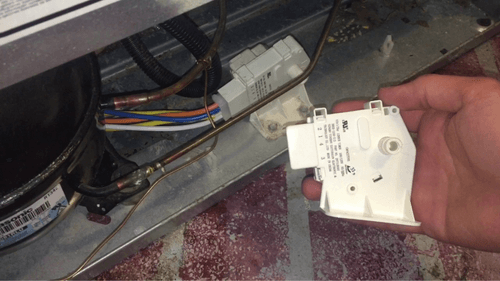
For those of you who do not know, a defrost timer is an electronic device present in all refrigerators. It is mainly responsible for regulating the defrost cycle, which can play a role in the constant running of the fridge. If you check and test this device, it can help you rule out any problems with the defrost timer.
To test the defrost timer in your fridge, you need to locate it after switching off the power supply to the refrigerator.
After this, take the timer out and test the reading with a multimeter. Deciphering the meaning of the reading is simple—just check for records showing zero or near zero.
Essentially, any record near zero indicates proper continuity and efficient functioning of the defrost timer. However, if the reading is zero, you may need to replace the faulty device and buy a new defrost timer.
2. Check The Defrost Heater
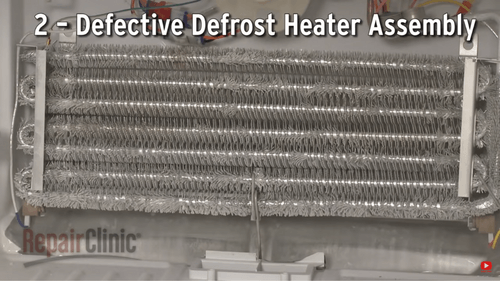
Similar to the defrost timer, the heater is under the control of the defrost thermostat and assists in defrosting whenever required. Any fault in the defrost heater will prevent the melting of excess ice.
To check this, turn off the fridge and find the heater near the evaporator coils.
Take care of not cutting or tearing the wires, and remove the heater from its position and check for readings using the multimeter. If you get a value between zero and infinity, it shows that the heater is working just fine.
However, getting any other reading means that the heater is malfunctioning, and you may need to get it fixed or replaced.
3. Door Gasket
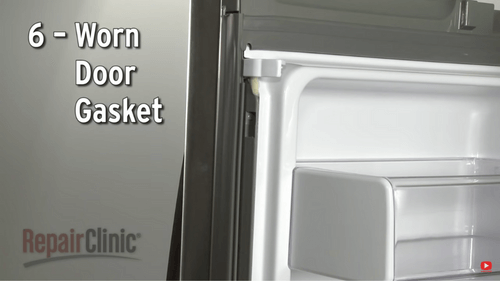
We’ve already described the potential issues of having a faulty gasket in the fridge doors. Visually, it may be possible to observe the moisture accumulation, but there is a test for checking the gasket function too.
All you need to do is place a piece of plain paper between the fridge and the door edge and pull it out. If the paper slides out easily without any resistance, the gasket is probably damaged and needs to be replaced.
Should The Refrigerator Compressor Run All The Time?
The fridge compressor is essentially the main engine of a refrigerator. It circulates the coolant or cool air throughout the fridge, carrying out the main purpose of a refrigerator.
If the compressor is in good condition, it will run 80 to 90% of the time with ease.
You will hear a buzzing or humming sound coming from the fridge when it is running. There is a refrigerator cycle that causes the compressor to switch on and off repeatedly.
Once enough coolant is circulated, it switches off, turning back on after a while. This cycle repeats throughout the day and works as an effective way to keep food fresh.
Symptoms Of A Failing Fridge
The easiest way to check whether the fridge has stopped working is by checking the internal temperature. If opening the refrigerator leads to a waft of warm air, something is not right with the system, and the fridge may be dying.
Similarly, frequent occurrences of food spoiling despite being in the fridge can point toward a failing fridge.
But, there are a few tell-tale signs that your fridge might be left with only a few functioning days.
1. Loud Noises Coming From The Fridge
Normally, a fridge will have a low humming sound when you get close to it. These are the sounds of an evaporator fan motor and compressor, so that’s entirely fine.
However, If the sounds are so loud that you can actually hear them while doing other tasks like cooking, then it might be a concern.
Periodic loud noises are an indication that the compressor might be in trouble, and it is best to contact an electrician to check this.
Often, a fridge completely stops working after the compressor struggles to function, so there could be a risk of food spoilage.
Ideally, call the mechanic sooner so that you do not have to waste good food.
2. Increase In Energy Bills
A sudden rise in energy bills without any apparent reason is never a good sign. The thing is, there could be dozens of reasons why the bills are going up.
There could be a problem with the room heating and cooling systems or maybe some appliance draining an unusually large amount of electricity every day.
While it is not easy to determine this, you’ll need to figure out which appliance is causing this and whether it is the refrigerator or not.
One way to find out is by observing the fluctuation in bills during different seasons. If the bills seem to consistently increase during warm and cooler seasons, it could mean a larger appliance like the fridge is responsible.
In any case, refrigerators become way less energy efficient as they age, and they may start pulling in more energy to maintain the correct temperature.
3. Frequent Food Spoilage
We’ve already mentioned that food spoilage is a quick indicator of something wrong with the fridge. Damage to any one part, whether it is the compressor or condenser coils, can have this effect on a fridge.
Besides, you also need to consider if the fridge is just too old to continue cooling with the same energy efficiency. If the device is around ten years old or more, there is a higher probability of food getting spoiled due to insufficient cooling.
Also, older refrigerators might not be able to tolerate heavy food loads, so you may need to reduce the number of items for proper functioning.
4. Frequent Condensation
Door gaskets aside, does the fridge leak from various places and create puddles on the floor? Constant sweating and condensation inside the fridge could indicate that it is getting too old and may need replacement.
Of course, it is better to check the door gaskets to rule out that possibility. If the gasket seal is intact, check the condenser coils to see if they need any help.
When the gasket and the coils seem to be in good condition, the only possible explanation is that the refrigerator is too old to function.
No amount of replacement methods might help at this point, so it would be best to buy a new fridge.
How often should a refrigerator cycle on and off
A refrigerator should cycle on and off regularly to maintain a consistent temperature. The frequency of cycling can vary depending on factors such as the size of the refrigerator, the temperature setting, and the surrounding room temperature.
A properly functioning refrigerator should cycle on and off every few minutes, but this can vary from several minutes to hours. If your refrigerator is cycling on and off too frequently, it may be a sign of a problem such as a faulty thermostat or a door that is not sealing properly.
On the other hand, if the refrigerator is not cycling on and off, it may indicate a problem with the compressor or a lack of proper ventilation. Consult the user manual or a professional service for further assistance if you have concerns.
How long should a refrigerator run before putting food in
Before putting food in a new refrigerator, it should be allowed to run for a certain amount of time to ensure proper cooling.
This is because refrigerators need time to reach the correct temperature after being transported and set up. The recommended time for a refrigerator to run before putting food in can vary depending on the make and model, but it’s usually between 24 and 48 hours.
During this time, it’s important to ensure that the doors are kept closed to maintain the desired temperature.
Additionally, it’s recommended to check the internal temperature of the refrigerator with a thermometer after the recommended time has passed to ensure it’s at a safe and appropriate temperature for storing food.
Frequently Asked Questions
Should a fridge be silent?
Since we mentioned that refrigerators must not be excessively loud, you may wonder how much noise is acceptable. Actually, a normally functioning fridge must not be completely silent because a running compressor will create a low humming sound.
Generally, a range of 32 to 47 dB of sound is acceptable for modern-day home refrigerators. If you see a fridge advertised as having a sound lower than 40 dB, it’s considered a quiet device. Before you purchase a new fridge, check the noise level it creates so that you are better prepared for it.
That being said, scratching or clanky loud sounds are abnormal and must not be overlooked.
How long must the fridge run when plugged in for the first time?
No matter what type of refrigerator is in question, most models run for 24 hours straight when plugged in for the first time. The device will need extra time and energy to ring down the temperature to an ideal constant.
Also, after getting a new fridge, avoid stuffing it with food and dishes right away. The better practice is to allow the refrigerator to run for at least four to five hours empty so that the temperature stabilizes.
Additionally, we do not recommend placing hot foods as soon as the fridge is plugged in since that can strain the cooling system.
Final Words
With this, we have reached the end of this informative guide about refrigerators and how long they are supposed to run.
On average, fridges will run for eight hours or more on a pleasant day. Remember that a few factors, like how full the fridge is, the size of the refrigerator, and the model and make, will affect the cooling cycle.
On your end, unnecessarily opening the fridge doors often and overstuffing it with too much food can be avoided.
Additionally, checking common issues like leaks and faulty gaskets can help detect issues in time and give you the opportunity to take quick action.
We’ll be back soon. Goodbye!



